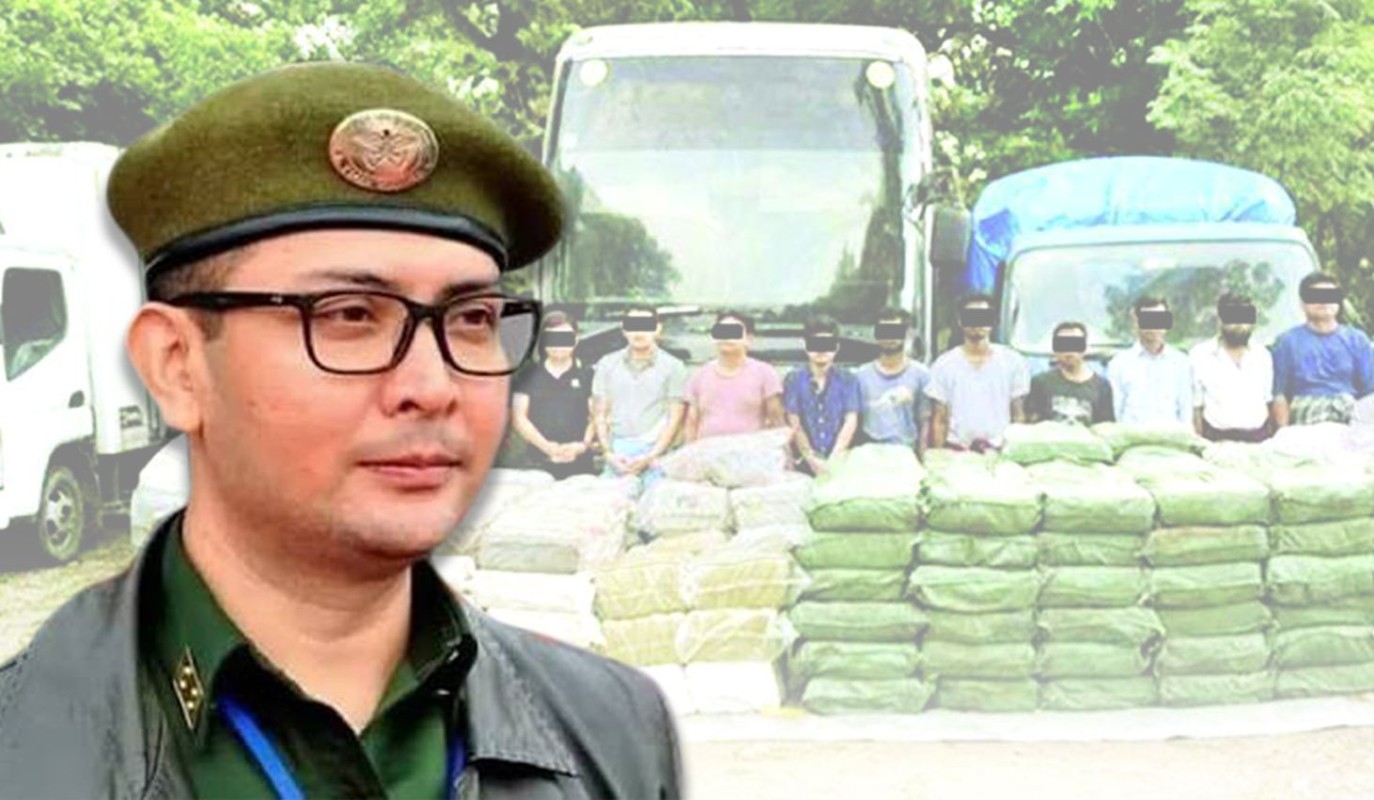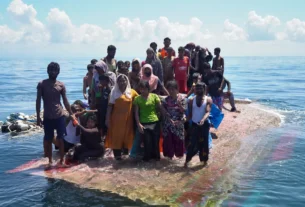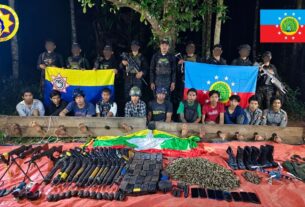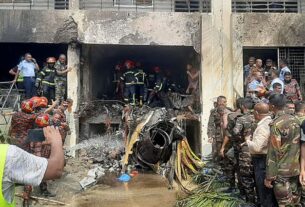By Aman Ullah
In Myanmar, the illegal drug market has seen the primary source of funding for the People’s Defense Forces (PDFs) and the Ethnic Armed Organizations (EAOs). Though need is always on the rise for firearms, ammunition, and logistics, these groups have found drug trafficking to be a lucrative way to not only maintain but also increase their power. The Arakan Army (AA) is one of the major offenders who have been involved in this illegal economy over a long period of time and deeply entrenched in it.
AA’s financing model
The Arakan Army (AA) presently has a controlling influence over 14 of Rakhine State’s 17 townships. The coastal area, which is adjacent to Bangladesh and has a port, is hence of great strategic value. Nevertheless, Rakhine is a less wealthy state with minerals and other natural resources as compared to other resource-rich states in Myanmar; therefore, the insurgents cannot easily establish an economic base out of it. Consequently, narcotics have become the main profit artery of the AA.
The AA was set up in 2009 on Kachin Independence Army (KIA) ground, and has since modelled its survival strategy similar to the KIA, United Wa State Army (UWSA), Myanmar National Democratic Alliance Army (MNDAA), and Ta’ang National Liberation Army (TNLA). Deprived of both local contributions and legal business activities, the AA decided to use narcotics smuggling as their main source of revenue, thus supplying food, weapons, and other necessities to their fighters.
Drug seizures and evidence of involvement
The Myanmar Police Force stated that the AA was one of the main drug traffickers linked directly to nine major drug seizures between 2016 and March 2024, with a total value of over 294.82 billion kyats (more than $1.4 billion). Besides, the group’s illicit drug trade has persisted well into 2025, as evidenced by a series of recent drug seizures.
Some significant drug and smuggling cases are as follows:
• December 3–9, 2023: A total of 2.07 tons of crystal methamp¬hetamine (ice) and 800 kilograms of caffeine, worth 51.87 billion kyats (more than $24 million), was confiscated. Authorities uncovered a drug smuggling operation involving four AA officers, three soldiers of low rank, and eight civilians. The report linked the incident to the AA leader Twan Mrat Naing and his close associate Kyaw Myat Oo (also known as Maung Naing/Than Thar/Wai Thar Htun), who was supervising the group’s finances.
• March 18, 2025: A businessman associated with the AA, who was involved in the transportation of over 3 tons of ice and 200 kg of ketamine, worth 96 billion kyats, was arrested.
• April 3, 2025: A drug-trafficking group linked to AA supporters was stopped just in time with the seized drugs valued at over 8 billion kyats.
• May 16, 2025: 26 individuals including an AA supporter were arrested while carrying off Shan State almost 300 billion kyats heroin to Malaysia to finance the AA.
• August 22, 2025: Illicit traffickers were caught smuggling drugs with the help of the AA into Malaysia, whose value was close to 260 billion kyats.
• September 12, 2025: Drugs estimated to be worth more than 170 billion kyats ended up in the hands of the police, and 16 distributors linked to AA were imprisoned.
All the evidence presented in courts shows that the AA is shipping methamphetamines and crystal meth from the Shan State to Rakhine through Mandalay and Yangon and that the drugs are being distributed locally, smuggled into Bangladesh, or being sent on ships to Malaysia and Indonesia for further export.
International drug networks
The AA’s drug smuggling activities have not only been confined to the areas around Myanmar but have also connected them to the global drug networks in regions such as Southeast Asia, the Middle East, Europe, and the United States.
The main export routes are: overland by way of Mandalay, Meiktila, Pyawbwe, Magway, Padan Road, Kyauktaw, and Mrauk U, crossing into Bangladesh; by sea along the Rakhine coast with the shipments being furthered to Malaysia and Indonesia; through sea routes near Yangon, which are considered the drug traffickers’ international gateway.
On September 15, 2025, Bangladesh’s Border Guard Force (BGB) publicly accused the Arakan Army (AA) of supplying yaba (methamphetamine pills) to Bangladesh. The report, which was the lead story of The Daily Star, highlighted the AA’s significant involvement.
in the regional drug trade.
The Department of Narcotics Control (DNC) in Bangladesh has estimated that the methamphetamine user population of the country has reached eight million. Over the past three years, the country has been ranked among the top five in the world in the amount of yaba seized, with over 50 million pills confiscated annually. The DNC’s 2021 report reveals a direct correlation between the drugs and smuggling paths under AA control, suggesting that the AA fighters are involved as transferring hubs in the drug supply chain.
Consequences for Rakhine and beyond
The AA’s reliance on narcotics revenues has fueled both its military strength and the cycle of violence in Rakhine:
• Replenishing arms: Drug profits allow the AA to continuously purchase weapons and ammunition depleted in combat.
• Rising violence: Smuggling networks expand corruption and criminal activity, destabilizing communities.
• Civilian suffering: The people of Rakhine bear the brunt of the AA’s militarization, facing displacement, insecurity, and erosion of social stability.
The press release by Bangla¬desh’s border forces revealed the AA’s operations to the international commu¬nity, putting its leadership, especially Twan Mrat Naing, under growing scrutiny. Yet, the group continues to expand its drug trafficking operations, which form the core of its business activities and revenue model.In fact, AA run its business mainly based on drug smuggling from the very beginning under the guidance of their boss (the puppeteer) so-called Kachin Independence Army – KIA. AA has expanded the drug market by using overland and nautical smuggling routes, primarily overland route to Bangladesh and India through Rakhine State, and nautical route to Malaysia and Indonesia. AA has stepped up its drug smuggling after 2016. Therefore, it happened frequently and heard about the seizure cases of AA’s drug traffickers and smugglers under the NLD government. Once in 2019 August,
AA admitted that a smuggler (Khaing Khaing San) was a former AA member. Actually, she is not an ex-member but recruited by AA in 2015 when she was working in Thailand, and working for AA as a member of the fundraising group for drug-related business.
Nay Lin Tun, who was arrested for drug trafficking in December 2023, joined the No (5) basic military training course of AA base in Laiza due to the connection with a Monk, U Eain Da, from Ariyarwatha Monastery, KyiteAnn village. He has served from the Private rank to Sergeant with the AA identification no. AA-00104, and became the Second lieutenant with AA identification no. AC-0321 in October 2019.
Htun Lin also joined the AA training course together with Nay Lin Tun in October 2011 due to the contact with the presiding monk of Dat Khaung Monastery, U Tat Da Ma. His AA identification no. is AA-00138. After serving from Private to Warrant officer rank, he became Lieutenant in November 2019 with AA identification no. AC-0037.
Soe Htun joined AA in May 2012 through the recruitment of AA Captain Htun Aung Phyu and attended the basic military course No ( , which opened in Laiza Kachin training ground. With AA identification no. AA-00178, he has served from the Private rank to Sergeant. In March 2019, he has become Lieutenant with AA identification no. AC-0304.
, which opened in Laiza Kachin training ground. With AA identification no. AA-00178, he has served from the Private rank to Sergeant. In March 2019, he has become Lieutenant with AA identification no. AC-0304.
Kyaw Han was recruited by AA in 2016 when he was living in MaHainKye ward of Mrauk-U Township, and attended the basic course in Mee Wa Base, Na Ma Thar village, Kyauktaw township. Currently, he is a Sergeant with AA identification no. AA-00287.
Htun Nu was also recruited and trained in Mee Wa AA’s Base in February 2022, and he is now serving as a Private with AA identification no. AA-18923.
Kyaw Lin San, with AA Identification no. AA-15473 was recruited in May 2020. He joined No (57) basic military course in Laiza, now he is a Private.
All those AA insurgents, arrested for drugs-related offences are working for drug trafficking and fundraising under the command of AA Colonel Kyaw Myat Oo (aka) Maung Nai (aka) Law Pann (aka) Thar Thar (aka) Wai Thar Tun (who was holding National Registration Identity Card (NRIC) with the name ‘Kyaw Myat Oo’).
Many Rakhine people, don’t want the ruining of stability in the region for the sake of a small group of self-seeking Arakanese by exploiting their ethnicity and Rakhine state. Although AA armed terrorist group is formed with some Arakanese, it is not accepted by all innocent Rakhine people. Because they are just drug smugglers, a criminal gang, and they make money from drug smugglings, which can endanger humankind.
The Arakan Army’s deep involvement in narcotics trafficking poses a severe threat not only to Myanmar’s domestic security but also to regional and international stability. Its networks have direct links to global cartels, spreading the destabilizing effects of the drug trade far beyond Rakhine State. As long as narcotics remain the AA’s financial lifeline, armed violence and instability will continue to intensify within Myanmar and across its borders.




